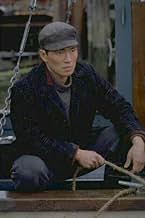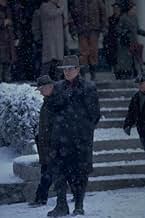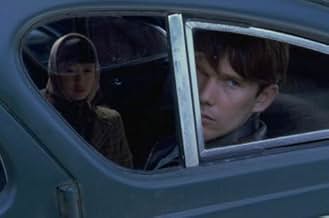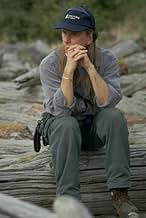Un japonés es acusado del asesinato de un pescador. Durante el juicio, el periodista que se encarga de efectuar la cobertura del proceso, reconoce a la esposa del acusado, su gran amor de ju... Leer todoUn japonés es acusado del asesinato de un pescador. Durante el juicio, el periodista que se encarga de efectuar la cobertura del proceso, reconoce a la esposa del acusado, su gran amor de juventud interrumpido cuando estalló la S.G.M.Un japonés es acusado del asesinato de un pescador. Durante el juicio, el periodista que se encarga de efectuar la cobertura del proceso, reconoce a la esposa del acusado, su gran amor de juventud interrumpido cuando estalló la S.G.M.
- Dirección
- Guionistas
- Elenco
- Nominado a 1 premio Óscar
- 5 premios ganados y 11 nominaciones en total
- Nels Gudmundsson
- (as Max Von Sydow)
- Hatsue Miyamoto
- (as Youki Kudoh)
- Carl Heine Sr.
- (as Daniel Von Bargen)
- Dirección
- Guionistas
- Todo el elenco y el equipo
- Producción, taquilla y más en IMDbPro
Opiniones destacadas
Set in 1950, the film chronicles the effect a mysterious death of a local fisherman has on the populous of a small island community made up mostly of whites and Japanese Americans, a death that, for complicated reasons, awakens many of the racial prejudices still holding over from the recently concluded war. As a Japanese man stands trial for the `murder,' Ishmael Chambers (Ethan Hawke), a mediocre reporter for the local paper, copes with three basic issues: his unrequited love for the defendant's Japanese wife, the flaring-up of anti-Japanese bigotry in both the past and the present, and haunting memories of his deceased father, a socially crusading newspaper publisher, in whose shadow Ishmael toils and against whose professional reputation Ishmael is tested and found wanting.
The film is definitely at its most emotionally powerful in its superb middle section, which beautifully dramatizes, in flashback, the shameful deportation of these Japanese-American citizens to interment camps in California, for no crime more serious than simply being of Japanese descent. Parallels to the rounding up of Jews in Nazi Germany are never far from our minds as we witness this wholesale forced migration of a group of innocent people singled-out to assuage the prejudice and fear of an ignorant but powerful majority. For these scenes alone, the film is most assuredly worth seeing.
Unfortunately, the rest of the film cannot sustain this same intensity of deep emotional conviction. The forbidden interracial childhood romance between Ishmael and Hatsue, the current wife of the man on trial, smacks a bit too much of tired Romeo and Juliet melodramatics. Furthermore, Ishmael seems underdeveloped as a character, too dreamy-eyed and passive, just the kind of character that can be easily swallowed up in a film in which the background plays such a prominent part. Moreover, the easy wrap-up of the trial is woefully unconvincing and unsatisfying both as realism and as drama.
On the positive side, `Snow Falling on Cedars' boasts a fascinating dual-level structure, in which small snippets of information are introduced to us in the form of near-subliminal quick cuts representing memories or speculations on past events, often, oddly, those at which none of the characters involved in the current scene were even present. This latter inconsistency in the film's point-of-view may seem dubious and questionable from a strictly narrative standpoint, but the format does help to flesh out the story and characters in interesting and intriguing ways, intensifying the mystery as we attempt to piece it all together to finally get a view of the whole picture. Director Scott Hicks, along with his co-writer Ron Bass, succeeds in providing a richly detailed glimpse into a shameful episode in American history - and the lyrical quality achieved through Robert Richardson's outstanding cinematography helps the film override some of its more obvious flaws. If one brings an attitude of patience and a fine eye for natural beauty to the film, `Snow Falling on Cedars' turns out to be quite rewarding, especially for those misguided misfits who still, at this late date, justify and defend the actions taken against the American Japanese during the war. This film is a stunning rebuttal to both them and their idiotic notions. For that aspect alone, `Snow Falling on Cedars' demands to be seen.
While it is not always possible to retain the feeling and spirit of a work of fiction through the screenplay writing process, I believe that this is one case in which the screen writers failed to capture the essence of the characters and what the author was trying to impart, despite the fact that Mr. Guterson was involved in the process.
Even though the movie departs from book in several vital area's that drastically change the symbology and moral of the story, the cinematography in this movie is splendid; it captures a feeling of 1950's Americana in very convincing fashion and by itself, this imagery brings much of the feeling of time home to the viewer in a real and emotionally dramatic sense.
It is really too bad that more was not done to preserve the beautiful symbology of the book and, though it must be a difficult task, that the essence of the characters was not more carefully interpretted in a true-to-the-book fashion. The director comments that he was not attempting a very literal translation, and in this I think he makes a rather grave mistake and ends up doing both the movie and the story a disservice.
Again, I highly recommend reading the book before watching this movie, even though it might take away from your appreciation of the cinematography as you struggle to reconcile the directors choices with the authors obvious intended meaning.
GOOD NEWS - On the first look, I was totally blown away and dazzled at the fabulous cinematography. Man, this is one of the prettiest movies I've ever seen.....and that's important for my entertainment. Scene after scene looks like some picture postcard. I also enjoyed the two lawyers in this film, played by James Rebhorn and Max VonSydow. Sometimes those two were riveting to watch.
BAD NEWS - Most of the story was anything but riveting, way too slow and with way too much time used on flashbacks. This story could have been told in a much more presentable way which could have kept the audience's attention. It's also a little too politically-correct. We were beaten over the head with the prejudice against Japanese. Everyone here, except the Liberal newspaper editor and his son, is portrayed as extremely bigoted.
Overall, a spectacular visual film - one of the best ever - but a story that takes interminably long to tell.....too long.
I loved the intellectual character of the young man who has to look past his own feeling and try to bring closure to someone he will never be able to have. The transitions are so breathtaking. The winter scenes are a portrait of softness and violence. My wife had read the book upon which this is based and said that the movie might be interesting. Apparently, the producers were unwilling to go the extra mile to get this noticed. It's a gem and deserves to be on a list of very fine movies.
¿Sabías que…?
- TriviaWhen the Japanese-Americans are sent to internment camps, many of the extras were Japanese-Americans who had actually been sent to the camps in the 1940s.
- ErroresJapanese guests wear black ties at the wedding. They should be wearing white ties. In Japan, black ties are for funerals.
- Citas
Nels Gudmundsson: It takes a rare thing, a turning point, to free oneself from any obsession. Be it prejudice or hate, or, even love.
- Créditos curiososJan Rubes and Sheila Moore are on the credits despite their scenes being deleted.
- Bandas sonorasMoon over Burma
Written by Friedrich Hollaender (as Frederick Hollander), Frank Loesser
Performed by Dorothy Lamour
Courtesy of the RCA Records Label of BMG Entertainment
Selecciones populares
- How long is Snow Falling on Cedars?Con tecnología de Alexa
Detalles
- Fecha de lanzamiento
- País de origen
- Sitios oficiales
- Idiomas
- También se conoce como
- Snow Falling on Cedars
- Locaciones de filmación
- Productoras
- Ver más créditos de la compañía en IMDbPro
Taquilla
- Presupuesto
- USD 35,000,000 (estimado)
- Total en EE. UU. y Canadá
- USD 14,417,593
- Fin de semana de estreno en EE. UU. y Canadá
- USD 32,135
- 26 dic 1999
- Total a nivel mundial
- USD 23,049,593
- Tiempo de ejecución2 horas 7 minutos
- Color
- Mezcla de sonido
- Relación de aspecto
- 2.39 : 1








































